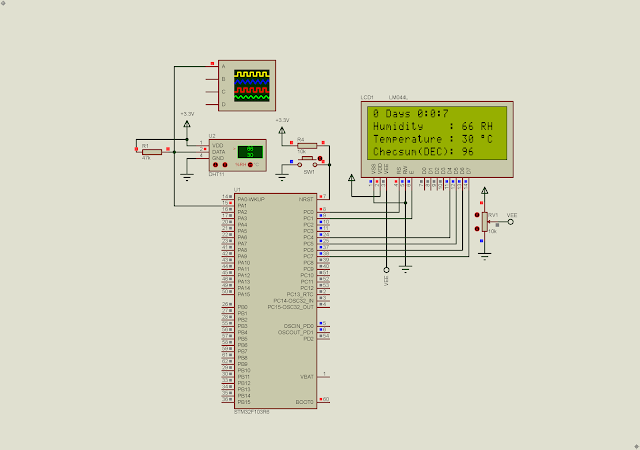A serial-in-parallel out shift registers allow a micro-controller to expand its digital output pins. The SN74HC595N is a popular shift registers chip with an 8-bit parallel output. It allows us to cascade a number of registers as many as possible.
 |
| Simulating Program |
It can be used as 7-Segment driver, dot matrix display driver, character LCD driver, etc. In this example, I will use it to drive LEDs.
 |
| SN74HC595N DIP Chip |
 |
| SN74HC595N Pin Out |
I use SPI1 communication module of the STM32F103R to interface with the shift registers chip.
I select SPI1 with Haft Duplex Mode. I use PA8 as the Data Latch Enable pin.
Click here to download its source file.
For other similar posts please check,
- Getting Started With STM32F103C8T6 Module with STM32CubeIDE
- STM32F103C8T6 Blue Pill SysTick and Multiplexing Display Example
- STM32F103C8T6 Blue Pill Switch And Multiplexing Display Interface Using SysTick
- STM32F103C8T6 Blue Pill SysTick LED Blinking
- STM32F103R6 Common Anode Seven Segments Display Example
- STM32F103R6 Common Anode Seven Segments Display And Switch Interfacing
- STM32F103R6 Simple 2-Digit Multiplexing Display And Switch Example
- STM32F103R6 SysTick And Digital Clock Example
- STM32F103R6 SysTick Two-Digit Multiplexing Display and Push Button
- LED Blinking With STM32F103R6 Using SysTick
- STM32F103R6 SPI Interfaces To SN74HC595N Shift Registers
- STM32F103R6 GPIO Interfaces To A Character LCD In 8-Bit Mode





No comments:
Post a Comment